Discworld: Ankh-Morpork
Sometimes you buy a game thinking you will really enjoy it, but when you start playing, you find that the mechanics don’t work right, or the rules are too cumbersome or – after investing a couple of hours of your play time – you realize that its just not worth the effort.
Other times, you are pleasantly surprised. The game is better than you thought. You don’t have to read the whole rule book four or five times to understand how it works. Its what keeps us buying new games over and over again, willing to put up with the clunkers for the chance of getting a really good one.
For me, Discworld is the gold nugget in the Cracker Jack box. It hits the sweet spot on so many levels that its hard to find anything to complain about. Except, maybe, for all those little colored wooden markers you end up scattering across the board.(I’m beginning to think that little colored wooden markers are taking over the entire gaming world, spreading and growing like Tribbles on the Enterprise. But, that’s paranoia talking.)
Anyway, the game is set in the fantasy city of Ankh-Morpork, the biggest, smelliest city on Discworld. The board shows its various neighborhoods, irregular-shaped areas which players can get control of and building, represented by – oh, drat – a colored wooden marker.
And, they can keep it as long as they have an agent in the neighborhood.
It may sound like a classic Euro-game, but you can kill off other agents. You can even destroy someone else’s building. And, you can spread chaos into a neighborhood, which makes it impossible for anyone to build there, no matter how many agents they have.
That’s for starters.
What makes Discworld really great, at least for me, is the hidden victory conditions. They are really hidden.
Each player picks a card representing a character, which shows what they have to do to win. Some win if they own enough buildings, others if they have spread trouble into a certain number of neighborhoods. Or, if they may win by keeping order and eliminating trouble spots. One player wins if you go through the action deck and no one else has won. Three of the eight victory condition cards are the same.
Its a system which actually lets a player try to block another one from winning, only to take an action which just might give them the game.
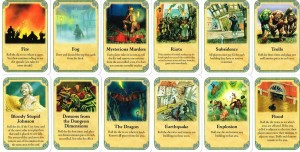 Discworld gets high marks for its artwork, for an attractive map to play on and for scores of action cards – each showing a character and the special actions a player can take using him, or her, or it. Those actions, by the way, are optional. If you think taking an action will help an opponent more than it will help you, you don’t have to take it.
Discworld gets high marks for its artwork, for an attractive map to play on and for scores of action cards – each showing a character and the special actions a player can take using him, or her, or it. Those actions, by the way, are optional. If you think taking an action will help an opponent more than it will help you, you don’t have to take it.
There is one exception. Some of the cards have a special event symbol, which must be followed. Of course, its not clear what taking that action will do to you, or to the other players.
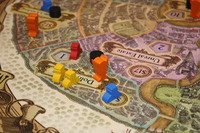 It might cause flooding in three randomly selected sectors, which will destroy any building in them. It could let loose a dragon which will burn any building in randomly selected neighborhoods (you just roll the dice to see where it strikes). Or, it could release little devils that infest a neighborhood and prevent anyone from building there until they are killed.
It might cause flooding in three randomly selected sectors, which will destroy any building in them. It could let loose a dragon which will burn any building in randomly selected neighborhoods (you just roll the dice to see where it strikes). Or, it could release little devils that infest a neighborhood and prevent anyone from building there until they are killed.
(To be fair, I am compelled to note that the devils are really little colored blocks of wood with horns on the top).
There are lots of options for players, and – since their actions are limited by the action cards they draw – every turn will come down to a choice between making money, spending it on buildings, spreading your influence or blocking the actions of another player. And what you do on turn three might not be at all useful on turn seven.
To steal a line from Tolkien, you can write a lot about unpleasant things, but enjoyable ones don’t really leave you much to say, except they are enjoyable. So, some quibbles:
- Not everyone will like Discworld. There are no armies to form and march, no great attacks, no secret weapons to unleash.
- You have to stay on top of the game. As it plays on, you should be able to get hint about what the other players are doing. If someone is really sneaky, they will do some things to throw you off the track. Try to find some of them, it makes the game more fun.
- You won’t ever play the same game twice. Even if you get the same victory conditions.
- Some neighborhoods are more expensive to build in, and give you better rewards for building there. Fantasy Capitalism!
Heck, for all of that, I’ll put up with all those little colored wooden markers.
Games Resources:


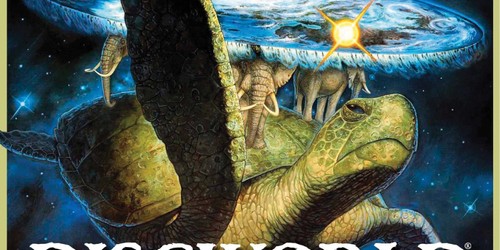
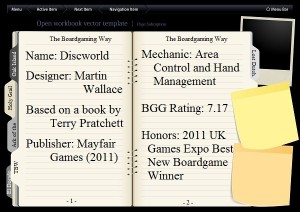
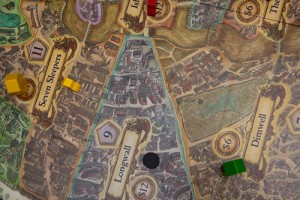







It’s a great game, thanks for summarising the fun succinctly. I liked the fluke destruction that comes with the golems, dragons or demons being summoned by the University; everyone shares in the fear of where their random effects land and it can change the game, which I think keeps it fresh. The cards are so rich in theme, for a Terry Pratchett fan they are heaven, for everyone else I recommend reading some of the Discworld books to get more from the game.
Its a relatively simple yet multi layered game and one of the favorites.